
Dental health is a crucial aspect of our overall well-being, and when it comes to tooth replacement, dental implants have revolutionized the field of dentistry. They offer a permanent solution for those missing one or more teeth, allowing individuals to regain their confidence, comfort, and functionality.
However, not all dental implants are created equal, and choosing the right type for your specific needs is essential.
The Importance of Dental Implants
Before delving into dental implant types and classifications, let's first understand the significance of dental implants in the world of dentistry.
When you lose a tooth due to injury, decay, or other dental issues, it not only affects your appearance, but can also lead to various oral health problems. Missing teeth can cause adjacent teeth to shift, affecting your bite and jaw alignment, and can even lead to bone loss in the jaw.
Dental implants serve as artificial tooth roots that are surgically placed into the jawbone. They provide a stable foundation for replacement teeth, whether it's a single tooth or an entire arch. Unlike traditional dentures or bridges, the best dental implants offer several advantages, including improved stability, durability, and a natural appearance.
Endosteal Dental Implants
Endosteal dental implants rank among the most frequently employed types within implant dentistry. These implants, typically constructed from titanium, undergo surgical insertion directly into the jawbone, effectively acting as synthetic tooth roots.
Endosteal implants exhibit remarkable adaptability, serving purposes ranging from the replacement of a solitary missing tooth to supporting entire arches of dentures. Their ascendancy in popularity springs from their unwavering stability and formidable durability. Once the implant attains osseointegration, a process involving the fusion of the implant with the jawbone, it establishes a robust foundation for the attachment of prosthetic teeth.
A pivotal advantage of endosteal implants resides in their remarkable long-term success rate, with numerous patients savouring the benefits of these implants for decades. Additionally, they actively contribute to the preservation of the jawbone by instigating bone growth, a process instrumental in averting the bone atrophy that often accompanies tooth loss.
Subperiosteal Dental Implants
Subperiosteal dental implants represent an alternative recourse for individuals confronting insufficiency in healthy bone within their jaw, a circumstance rendering traditional endosteal implants unfeasible. These implants are situated beneath the gumline but atop the jawbone, where they repose upon a metallic framework or supporting structure.
The utility of subperiosteal implants peaks when patients contend with considerable bone depletion within their jaw, a consequence often precipitated by extended periods of tooth loss or prevailing medical conditions.
Nonetheless, it is important to discern that subperiosteal implants have receded in prevalence in contemporary times. This phenomenon arises as advances in the realm of bone grafting techniques and implant materials have elevated the accessibility of endosteal implants to a majority of patients. Your dentist will meticulously evaluate your unique scenario to ascertain the suitability of subperiosteal implants for your exigencies.
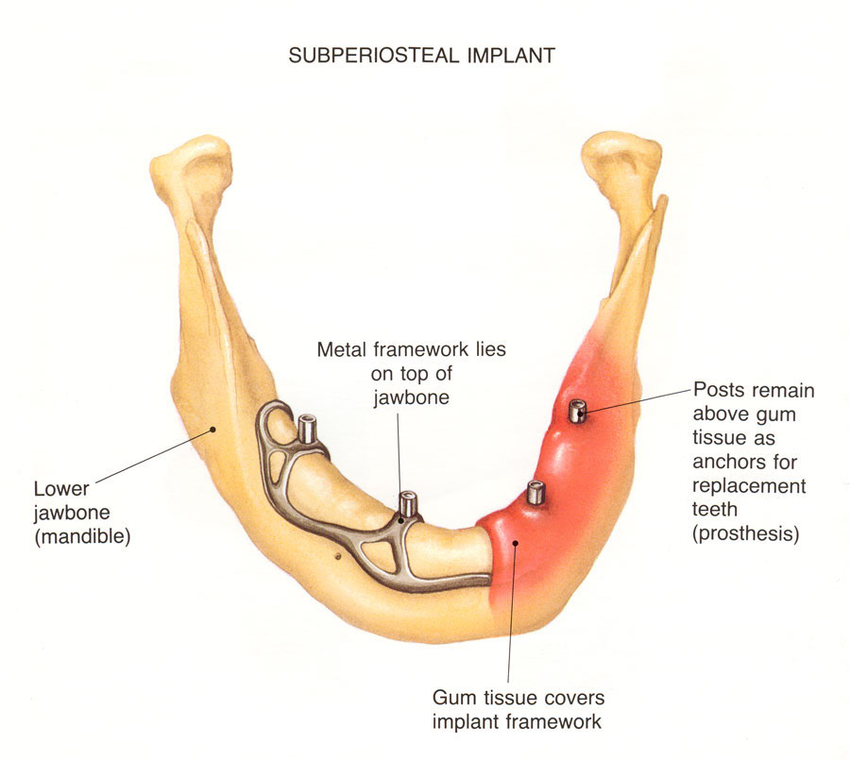
Mini Dental Implants
Mini dental implants, also recognized as MDIs or small-diameter implants, represent a diminutive and less intrusive alternative to conventional dental implants. These implants typically serve the purpose of fortifying dentures, securing bridges, or replacing diminutive teeth.
Mini implants share the same biocompatible materials as their larger counterparts, but distinguish themselves through their reduced diameter. Their diminished dimensions translate into a diminished prerequisite for bone structure, rendering them viable options for individuals with insufficient bone density.
In scenarios where conventional implants might not be practical, mini dental implants offer a swifter and more economical solution, especially for patients desiring enhanced stability for their dentures. Their placement typically transpires in a single dental session, frequently affording patients a procedure marked by minimal discomfort.
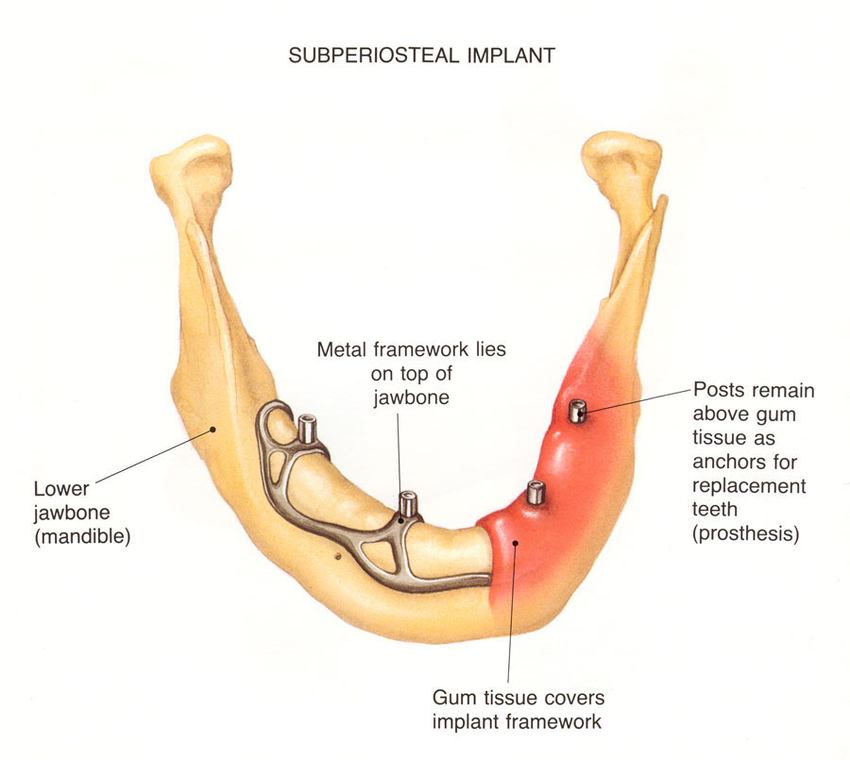
All-on-4 and All-on-6 Implants
All-on-4 and All-on-6 implants epitomize innovative solutions geared toward individuals necessitating comprehensive arch restoration, particularly in instances characterized by complete edentulism—the absence of all teeth within a given arch.
The conceptualization of "All-on-4" entails the judicious deployment of four strategically positioned implants to bolster an entire arch of teeth. "All-on-6" augments the stability quotient by integrating six implants into the equation.
It remains imperative to underscore that not all individuals represent apt candidates for All-on-4 or All-on-6 implants, mandating the indispensable necessity for an exhaustive evaluation by a dental professional to ascertain eligibility.
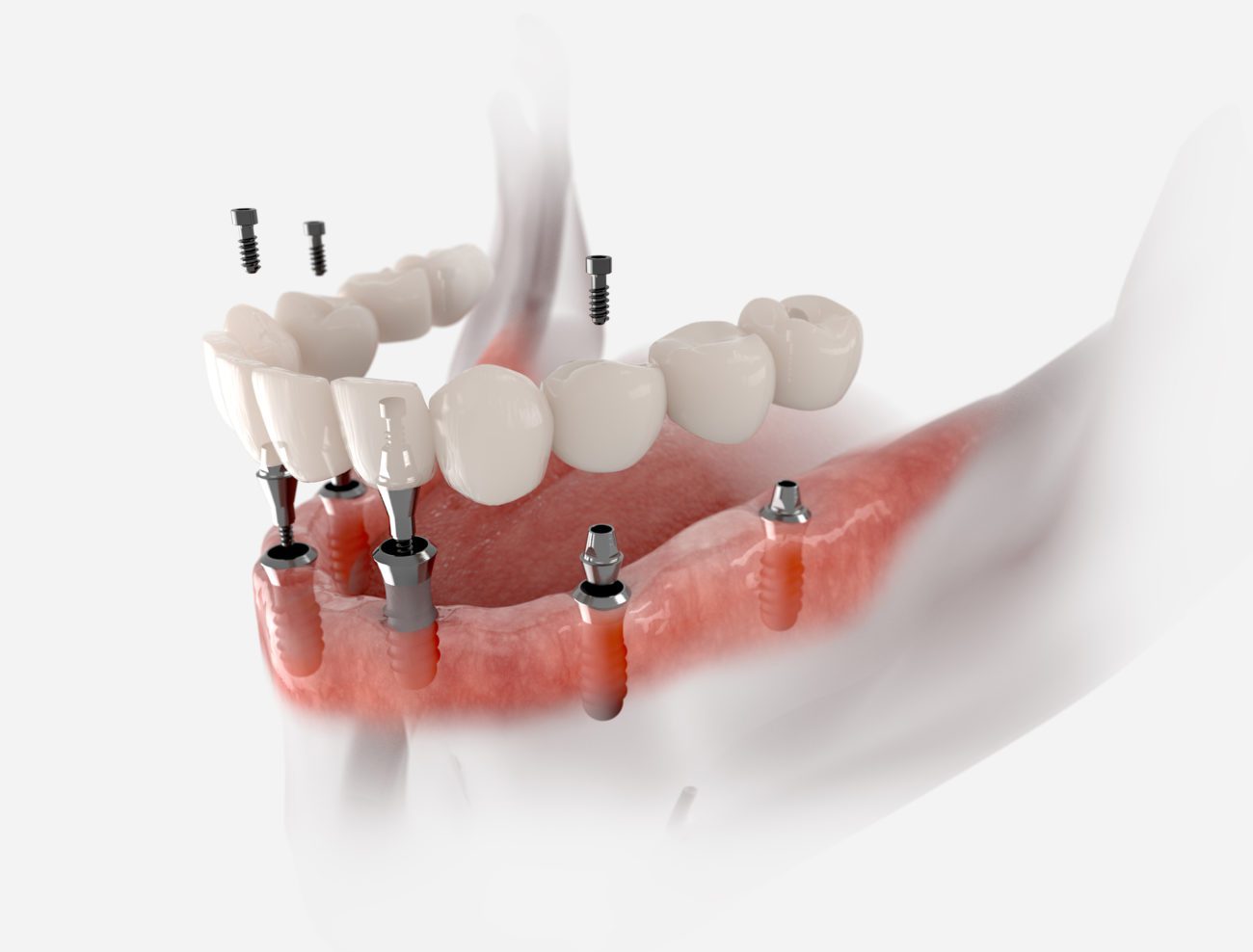
Immediate Load Dental Implants
Immediate load dental implants, also renowned as same-day implants, cater to individuals harbouring a predilection for a swift tooth replacement solution. These implants facilitate the affixation of a provisional crown or bridge on the very day of implant installation.
Immediate load implants offer the boon of expedience, abbreviating the duration of time spent sans teeth. Nevertheless, it is incumbent to exercise prudence in case selection, for not all patients warrant this expeditious approach. Factors encompassing bone density, implant stability, and overall oral health carry discernible weight in the determination of eligibility.
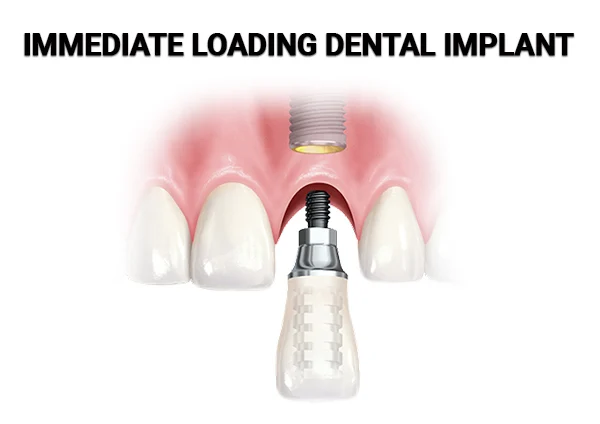
Two-Stage Dental Implants
Two-stage dental implants encompass both surgical and prosthetic phases. In the initial stage, the implant is surgically emplaced within the jawbone and cloaked beneath gum tissue. Subsequent to a healing interim, a second procedure materializes, entailing the attachment of an abutment and prosthetic tooth.
Two-stage dental implants epitomize a time-honoured and universally accepted modality, with a high success rate and enduring dependability. This approach facilitates thorough osseointegration, the pivotal process by which the implant seamlessly integrates with the jawbone, thus culminating in the attachment of the prosthetic tooth.
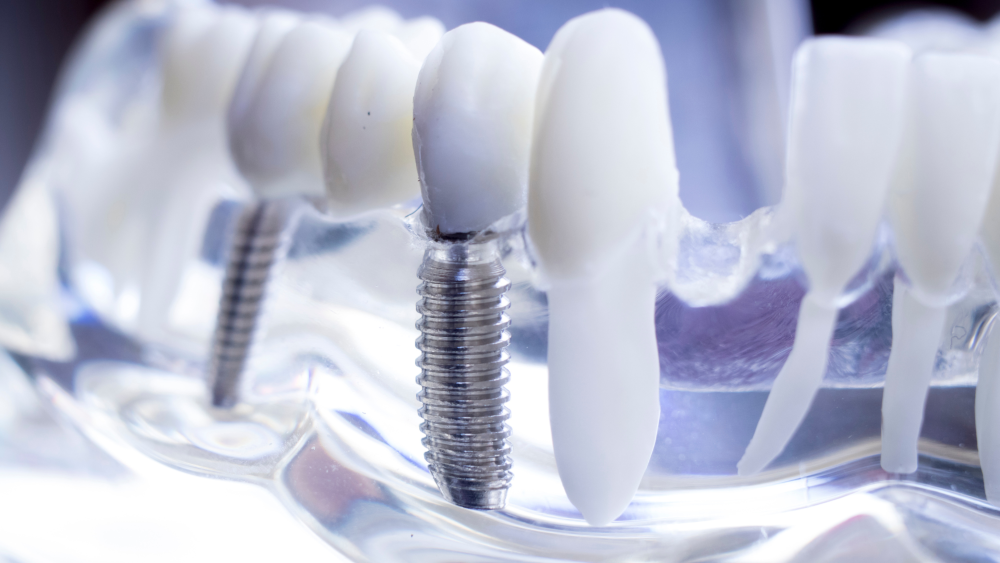
 Single Tooth Implants vs. Multiple Tooth Implants
Single Tooth Implants vs. Multiple Tooth Implants
The choice between single tooth implants and multiple tooth implants depends on the specific needs of the patient. Single tooth implants are used when a single tooth is missing, while multiple tooth implants are employed when several adjacent teeth are missing.
The decision between single and multiple tooth implants is influenced by factors such as cost, aesthetics, and the overall health of the adjacent teeth. Your dentist will conduct a thorough assessment to determine the most suitable approach for your case, ensuring the best quality dental implants for you.
Hybrid Dental Implants
Hybrid dental implants are a versatile solution that combines features of various implant types. These good dental implants are customized to meet the specific needs of each patient, offering a tailored approach to tooth replacement.
Hybrid implants are designed to provide optimal stability and functionality while addressing individual concerns. They may incorporate elements of endosteal, subperiosteal, or mini implants to create a hybrid system that suits your unique situation. This versatility makes them an excellent choice for complex cases and patients with specific requirements.
Dental Implants at North York Smile Centre
At North York Smile Centre, we understand the importance of choosing the right dental implant type for your individual needs. Our experienced team of dental professionals is dedicated to providing personalized care and ensuring that you receive the best possible treatment options.
Whether you require single-tooth implants, full arch restoration, or any other dental implant procedure, our state-of-the-art facility and commitment to excellence make us a trusted choice for dental implants in North York.
All in all, different dental implants have transformed the way we address tooth loss, offering permanent and reliable solutions for patients of all ages. With various types of permanent dentures and dental implants available, it's essential to consult with a qualified dentist to determine the most suitable option for your unique circumstances.
Whether you opt for endosteal implants, subperiosteal implants, mini dental implants, All-on-4 or All-on-6 implants, immediate load implants, two-stage implants, single tooth or multiple tooth implants, or even hybrid implants, the goal of all dental implant systems is the same – to restore your smile and oral health, giving you the confidence to live life to the fullest.
Choose the best type of dental implants, and take the first step toward a brighter, healthier future for your smile. Contact us at North York Smile Centre today for your best solution for missing teeth.


